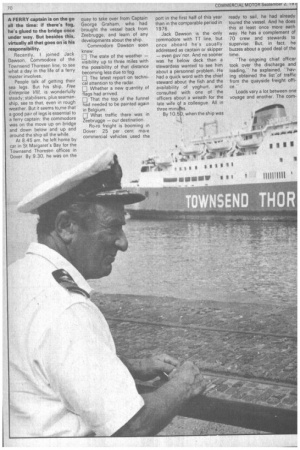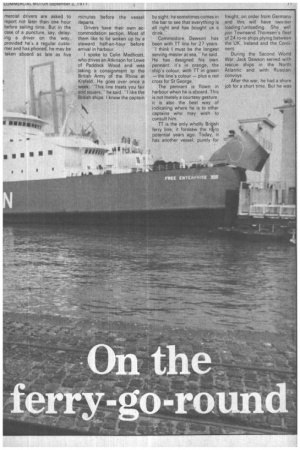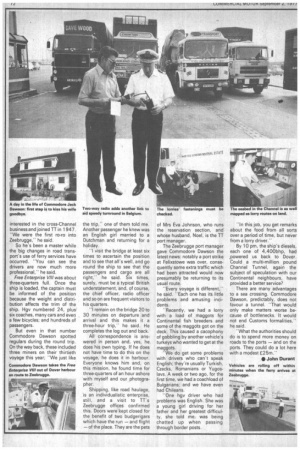A FERRY captain is on the go all the time:
Page 72

Page 73

Page 74

If you've noticed an error in this article please click here to report it so we can fix it.
if there's fog, he's glued to the bridge once under way. But besides this, virtually all that goes on is his responsibility.
Recently, 1 joined Jack Dawson, Commodore of the Townsend Thoresen line, to see what a day in the life of a ferry master involves.
People talk of getting their sea legs. But his ship, Free Enterprise VIII, is wonderfully steady; stabilisers, plus seamanship, see to that, even in rough weather. But it seems to.me that a good pair of legs is essential to a ferry captain: the commodore was on the move up on _bridge and down below and up and around the ship all the while.
At 8.45 am, he left home by car in St Margaret's Bay for the Townsend Thoresen offices in Dover. By 9.30, he was on the quay to take over from Captain George Graham, who had brought the vessel back from Zeebrugge, and learn of any developments about the ship.
Commodore Dawson soon knew: Li The state of the weather -visibility up to three miles with the possibility of that distance becoming less due to fog.
0 The latest report on technical attention to the radar.
[11 Whether a new quantity of flags had arrived.
E That the top of the funnel had needed to be painted again in Belgium.
[11 What traffic there was in Zeebrugge — our destination.
Ro-ro freight is booming in Dover: 25 per cent more commercial vehicles used the port in the first half of this year than in the comparable period in 1976.
Jack Dawson is the only commodore with TT line, but once aboard he's usually addressed as captain or skipper — even guv'nor. And no sooner was he below deck than a stewardess wanted to see him about a personnel problem. He had a quick word with the chief steward about the fish and the availability of yoghurt, and consulted with one of the officers about a wreath for the late wife qf a colleague. All in three minutes.
By 10.50, when the ship was ready to sail, he had already toured the vessel. And he does this at least once more each way. He has a complement of 70 crew and stewards to supervise. But, in fact, he buzzes about a good deal of the time.
"The ongoing chief officer took over the discharge and loading," he explained, "having obtained the list-.of traffic from the quayside freight off ice."
Loads vary a lot between one voyage and another. The corn mercial drivers are asked to report not later than one hour before sailing time. But in the case of a puncture, say, delaying a driver on the way, provided he's a regular customer and has phoned, he may be taken aboard as late as five minutes before the vessel departs.
Drivers have their own accommodation section. Most of them like to be woken up by a steward half-an-hour before arrival in harbour.
I spoke to Cohn Medlicott, who drives an Atkinson for Lowe of Paddock Wood and was taking a consignment to the British Army of the Rhine at Krefeld. He goes over once a week. "This line treats you fair and square," he said. "I like the British ships. I know the captain by sight; he sometimes comes in the bar to see that everything is all right and has bought us a drink."' Commodore Dawson has been with TT line for 27 years, "I think I must be the longest serving master at sea," he said. He has designed his own pennant: it's in orange, the ship's colour, with TT in green — the line's colour — plus a red cross for St George.
The pennant is flown in harbour when he is aboard. This is not merely a courtesy gesture; it is also the best way of indicating where he is to other captains who may wish to consult him.
TT is the only wholly Bripsh ferry line; it foresaw the rcVo potential years ago. Today, it has another vessel, purely for freight, on order from Germany and this will have two-tier loading /unloading. She will join Townsend Thoresen's fleet of 24 ro-ro ships plying between the UK, Ireland and the Continent.
During the Second World War. Jack Dawson served with rescue ships in the North Atlantic and with Russian convoys.
After the war, he had a shore job for a short time, But he was interested in the cross-Channel business and joined TT in 1947, "We were the first ro-ro into Zeebrugge," he said.
So he's been a master while the big changes in road transport's use of ferry services have occurred. "You can see the drivers are now much more professional," he said.
Free Enterprise VIII was about three-quarters full. Once the ship is loaded, the captain must be informed of the position because the weight and distribution affects the trim of the ship. Hgv numbered 24, plus six coaches, many cars and even a few bicycles; and hundreds of passengers.
But even in that number Commodore Dawson spotted regulars during the round trip. On the way back, these included three miners on their thirtieth voyage this year; "We just like the trip," one of them told me. Another passenger he knew was an English girl married to a Dutchman and returning for a holiday.
"I visit the bridge at least six' times to ascertain the position and to see that all's well, and go round the ship to see that the passengers and cargo are all right,he said. Six times, surely, must be a typical British understatement, and, of course, the chief officer, radio officer and so on are frequent visitors to his quarters.
-I remain on the bridge 20 to 30 minutes on departure and arrival and this makes it a three-hour trip," he said. He completes the log out and back.
All correspondence is answered in person and, yes, he does his own typing. If he does not have time to do this on the voyage, he does it in harbour. Everyone knows him and, on this mission, he found time for three-quarters of an hour ashore with myself and our photographer.
Shipping, like road haulage, is an individualistic enterprise, still, and a visit to Ti's Zeebrugge offices confirmed this. Doors were kept closed for the benefit of two budgerigars which have the run — and flight — of the place. They are the pets of Mrs Eva Johnson, who runs the reservation section, and whose husband, Noel, is the TT port manager.
The Zeebrugge port manager gave Commodore Dawson the latest news: notably a port strike at Felixstowe was over, consequently some extra traffic which had been attracted would now presumably be returning to its usual route.
"Every voyage is different," he said. "Each one has its little problems and amusing incidents.
"Recently, we had a lorry with a load of maggots for Continental fish breeders and some of the maggots got on the deck. This caused a cacophony of gobbling by another vehicle's .turkeys who wanted to get at the maggots.
"We do get some problems with drivers who can't speak English; they're usually Turkish, Czecks, Romanians or Yugoslays. A week or two ago, for the first time, we had a coach load of Bulgarians; and we have even had Chileans.
"One hgv driver who had problems was English. She was a young girl driving for her father and her greatest difficulty, she told me, was being chatted up when passing through border posts. "In this job, you get remarks about the food from all sorts over a period of time, but never from a lorry driver."
By 10 pm, the ship's diesels, each one of 4,400bhp, had ,powered us back to Dover. Could a multi-million pound Channel Tunnel, again the subject of speculation with our Continental neighbours, have provided a better service?
There are many advantages to a sea crossing. Commodore Dawson, predictably, does not favour a tunnel. "That would only make matters worse because of bottlenecks. It would not end Customs formalities," he said.
"What the authorities should do is to spend more money on roads to the ports — and on the ports. They could do a lot here with a modest £25m."
.0 John Durant




































































































































